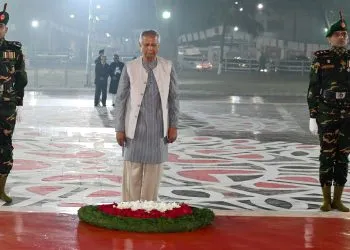
Over the past 54 years, Bangladesh’s journey as a nation has shown that its challenges are not merely economic, social, demographic, or geographical but also deeply political. Specifically, the core issue lies in the structural complications within the constitution. For the past 200 years, new state structures around the world have primarily been built through written constitutional documents. The framework of Bangladesh, born from the Declaration of Independence on April 10, 1971, and the Liberation War, was established through the Constitution of 1972.
The constitution was passed in a manner similar to an ordinary law, mainly to meet immediate needs. This structure made it easy for the executive branch to control the entire state. Consequently, various populist and divisive ideologies were incorporated into the constitution—many of which lacked any real necessity or demand.
Three core principles—nationalism, secularism, and socialism—have been the primary sources of division. Other divisive elements include state religion, citizenship, the state language, the concept of the Father of the Nation, the discourse on indigenous versus tribal/minority groups, and the ideology of the Liberation War.
Ironically, the Liberation War ideology, which was supposed to be a foundation for national unity, was turned into a key tool of division during Sheikh Hasina’s 15-year rule.
Nationalism
Professor Anisuzzaman’s autobiography Bipula Prithibi describes how Bengali nationalism was incorporated as a state principle. He wrote,
“On February 6, 1972, Bangabandhu went to Kolkata on a state visit, where he received an extraordinary reception. In his speech at a public gathering in Kolkata, he added ‘nationalism’ to the state principles of Bangladesh.”
The first formal mention of the so-called “four principles of the Liberation War”—nationalism, socialism, secularism, and democracy—was in the proposal on the Declaration of Independence, presented to the Constituent Assembly on April 10, 1972.
Many have questioned the justification of including nationalism as a state principle, as it is no longer considered a highly esteemed ideology. Although Bengalis form the majority, Bangladesh is home to many other ethnic groups. While nationalism often serves as a unifying force during movements and struggles, state-building requires an inclusive identity structure. Therefore, instead of prioritizing a single nationalist identity, the name of the country itself should have been emphasized in the constitution.
This “fundamental mistake” of the constitution was later amended during Ziaur Rahman’s tenure, when citizenship was defined as “Bangladeshi.” In the 15th Amendment, Sheikh Hasina’s government was forced to uphold the concept of “Bangladeshi” citizenship, acknowledging its validity. However, a contradictory statement was inserted: “The people of Bangladesh shall be known as Bengalis as a nation, and as Bangladeshi in terms of citizenship.” This reintroduced ideological division.
The consequences of this division are complex. The discriminatory attitudes and dominance of Bengalis over various indigenous groups in the hills and plains, as well as the Biharis, reveal the underlying reality of Bengali nationalism. Therefore, keeping an ideology like nationalism—bordering on racism—as a state principle does not seem justifiable or progressive but rather discriminatory.
The original Declaration of Independence does not mention Bengali nationalism; instead, it refers to the “People of Bangladesh.”
Secularism and Socialism
Regarding the inclusion of secularism in the constitution, Professor Anisuzzaman wrote in Bipula Prithibi,
“Bangabandhu called Kamal (Dr. Kamal Hossain) twice for consultations on the constitution, and I was also present. His first directive was that there should be a provision in the constitution to separate religion from politics. This was somewhat addressed in Article 12, but what Bangabandhu truly wanted was reflected in the conditional section of Article 38 (which banned religious political organizations).”
However, secularism and socialism cannot be considered ideologies of the Liberation War; rather, they were principles of the post-war Awami League government and Mujib’s state vision. In reality, the four principles—Bengali nationalism, democracy, socialism, and secularism—were collectively referred to as Mujibism. In his book Mujibbad, Khondkar Mohammad Elias quoted Sheikh Mujib as saying,
“I believe Bangladesh must progress along the lines of nationalism, secularism, democracy, and socialism, in its own unique way. Some have started calling this ideology ‘Mujibism.’”
Interestingly, secularism was not originally included in India’s constitution either. During the Emergency in 1976, Indira Gandhi introduced secularism through the 42nd Amendment. Her attempt to “rewrite” the constitution was so aggressive that some critics labeled it the “Constitution of Indira” rather than the “Constitution of India.”
Similarly, Sheikh Mujib incorporated secularism and socialism into Bangladesh’s constitution without public demand, much like Indira Gandhi. Some speculate that both leaders were influenced by Khushal Talaxi Shah, a member of India’s Constituent Assembly, who twice tried (unsuccessfully) to include secularism and socialism in India’s constitution in 1948 but was opposed by B. R. Ambedkar.
Sheikh Mujib’s government had only one mandate—the 1970 election—where the Six-Point Movement was the manifesto. This manifesto did not include Bengali nationalism, secularism, or socialism. Instead, it focused on establishing a federal system, a parliamentary government elected by universal suffrage, autonomy over taxation and trade, and the formation of a paramilitary force in East Pakistan.
Ambedkar argued that a constitution should merely outline the functioning of the state’s institutions rather than serve as a political project to install a particular individual or party in power. He believed the principles of governance and societal organization should evolve over time based on public discourse, not be permanently engraved in the constitution. By embedding ideological doctrines like secularism and socialism in fundamental rights and state policies (Articles 13-20), Bangladesh’s constitution created unnecessary ideological burdens.
The Inclusion of Religion in the Constitution
The debate over secularism did not end in the Constituent Assembly but continued in the public sphere. In 1975, after the collapse of BAKSAL, secularism was removed, and Bismillah and absolute trust and faith in Almighty Allah were added to the constitution. However, this change did not face much public resistance.
Later, H. M. Ershad declared Islam as the state religion, yet this move did not provoke widespread opposition either. Although the introduction of a state religion pleased the majority, it did not provide tangible benefits, such as job quotas for Muslims. Instead, quotas were reserved for ethnic minorities, freedom fighters, districts, and women—secular categories.
In 2011, Sheikh Hasina’s government removed the phrase “absolute trust and faith in Almighty Allah” through the 15th Amendment but retained Bismillah and Islam as the state religion. This reflects a strategic balancing act—appeasing both secularists and religious conservatives.
Conclusion
Bengali nationalism, with its exclusionary tendencies, along with the arbitrary inclusion of secularism and socialism, has sustained ideological division in Bangladesh. To appease different factions, Bismillah and the state religion remain, while secularism is dangled as a vague promise. This ideological deception has fueled ongoing conflicts between opposing factions.
The 2024 mass uprising has created an opportunity to rebuild Bangladesh. The Constitutional Reform Commission has already submitted its report, recommending a reassessment of divisive ideological elements. Moving forward, it is expected that such divisive principles will no longer be included in the constitution.
— Millat Hossain
(Writer & Researcher on Constitutional Law and Judiciary)
Source: Prothom Alo (Bangla), English Translated by AB Arif, Sub-Editor, Daily Spostobadi.com


Discussion about this post